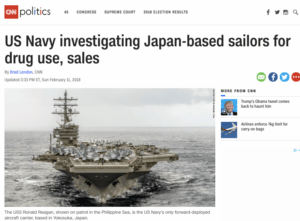USS RONALD REAGAN NAVY DRUG RING COURT-MARTIAL
 We recently represented a sailor accused of serious drug allegations in connection to the headline news coverage of a Navy drug ring in Yokosuka, Japan with member of the USS Ronald Reagan. Our aggressive efforts led our client to reach an outstanding deal and has potentially chilling effects on clients that choose less aggressive civilian counsel or stuck with military counsel.
We recently represented a sailor accused of serious drug allegations in connection to the headline news coverage of a Navy drug ring in Yokosuka, Japan with member of the USS Ronald Reagan. Our aggressive efforts led our client to reach an outstanding deal and has potentially chilling effects on clients that choose less aggressive civilian counsel or stuck with military counsel.
Navy Drug Ring at Yokosuka Background
The media reports certainly focused on the allegation that sailors were importing LSD and MDMA (Ecstasy) into Japan in fairly high quantities and distributing to a fair number of people.
The NCIS investigation into this case took over six months to complete. In the end, the identified approximately a dozen sailors that had minor level involvement, mostly in the scope of a one-time use of an illegal substance. Those sailors were administratively disciplined and discharged from the Navy.
The investigation focused on allegations that a smaller number of sailors were responsible for the conspiracy to distribute and the actual distribution. Most of those sailors were notified that they would be facing felony level charges in the fall of 2018.
Fighting Drug Ring Allegations
Our client was alleged to have conspired to distribute LSD and MDMA, that he actually distributed MDMA, and that a large quantity of MDMA was found in a raid on his apartment in Yokosuka. Our client insisted that the charges were outrageously exaggerated and he remained dedicated to fighting hard against the Government over-reaching.
Instead of waiting to act on the allegations, we moved quickly to demand an immediate preliminary hearing. We are able to secure a hearing date just days after the initial notification because of our frequent work in Japan. Andy Cherkasky was already in Japan for another case, and was able to move his itinerary and prioritize the needs of our sailor at Yokosuka.
Meanwhile, other civilian counsel and military counsel delayed. It is frequently the case that civilian counsel slow-roll their cases while they attend to their case loads. Those attorneys are usually single attorney law firms without the administrative support necessary to attend to their client’s needs. Our attorneys work as a team to help distribute the needs of our clients so that we are able to respond quickly to a client that needs us tomorrow, not seek delays for weeks or months.
In fact, we were so quick to act, that even our client’s assigned military counsel could attend the hearing. They are overworked and under-motivated to act as quickly and efficiently as our clients really need.
The Best Way to Defend a Drug Ring
After more than 30 years of combined experience handling dozens of major drug rings, and many dozens more minor drug rings, we know speed is often our best friend. Getting your client to the top of the list often means you can cut the best deal, get a judge that hasn’t already been tainted by the other cases, and avoid the snitches that come when you are prosecuted last.
At the preliminary hearing we were able to present very compelling evidence that our client was a very minor actor in the entire navy drug ring at Yokosuka. To start, we created substantial doubt regarding whether the many pills of MDMA and the traces of MDMA that NCIS found in our client’s apartment and on a scale in his bathroom was actually MDMA. The whole time leading up to the preliminary hearing the Government was acting on the positive tests from the on-scene testing by the agents.
During the preliminary hearing, we presented brand new lab reports that showed the presumptive NCIS testing was wrong and that the various pills and residue were not MDMA. This was a huge revelation that ultimately provided tremendous leverage for our client.
Additionally, our rush to get to the preliminary hearing meant the data from our client’s phone and computer devices provided no evidence that helped the Government. The prosecution was left with only one email that our client didn’t write or receive that indicated he was involved in LSD distribution.
In the end, the case was ordered to a felony court-martial, but the prosecution knew we had started the process of destroying their case that suggested our client was a major player in the Yokosuka drug ring.
Cutting a Deal in a Military Drug Ring
In the end, we knew it was important to cut a deal because there was overwhelming evidence that our client distributed MDMA on a single occasion and the Government had leverage over us because they were planning to take the case to a General Court-Martial. That means, even if our client was acquitted of all the most serious charges but was still convicted of the one time distribution, he would be convicted of a felony and face up to 5 years of confinement and a dishonorable discharge. A felony conviction and dishonorable discharge can have major long term consequences in life.
Instead, we were able to negotiate a fantastic deal with the prosecutors to avoid a felony trial and substantially limit confinement. First, we negotiated that the conviction would be a misdemeanor. Second, we insisted that our client would not receive a dishonorable discharge. Third, we demanded no more than 60 days of confinement time. Finally, we convinced the prosecution to drop the exaggerated charges.
This deal was negotiated before any of the other individuals that were identified as major players. Obviously, in any case where you are the first to negotiate a deal there is a risk that the deals will get better over time, but given our experience, that is rarely the case. For as good of a deal as we secured, it was a no-brainer, and obviously advantageous to move before anyone else tried to cut a deal at the expense of providing information against our client.
Important note that our client would want published: Although most deals require an Accused to provide assistance in the prosecution or investigation of others implicated in the crimes, in this case, our client will not provide any information the Government doesn’t already have in their possession.
The Drug Ring Court-Martial
The benefit of cutting a deal in a military trial is that the judge doesn’t know the details of the deal. That mean, when you go to trial, you can put on your very best case and try to “beat the deal”. For example, if you cut a deal capping confinement at 6 months, but the judge only orders 4 months, you get the benefit of the judge’s ruling. If the judge comes back with 10 months, you are capped at the 6 months.
So, we still went to trial and did everything we could to get an even better result. Many of the other cases are focused on a legal strategy centered around the idea that the ship ordered particularly arduous restrictions on the accused individuals prior to trial. Knowing the law, and having intel on the judge’s background, I felt strongly that their legal strategies were not worth the risk of not getting a good deal. Instead, we put all of the evidence of the arduous conditions before the judge as justification for lowering the sentence.
We were also able to paint a convincing picture of our client’s limited involvement in the drug ring. Our client testified and made a statement about his positive contributions to the Navy, his deep regret, and his efforts to rehabilitate. All of the evidence was compelling.
In the end, the judge returned with a sentence of 6-months confinement among other forms of punishment. Because of the deal we cut, our client will only serve 1/3 of the time ordered by the judge.
What is a Good Deal in a Military Drug Case
In this case, we can definitively say that we got a great deal. Where the judge ordered such a severe sentence in excess of what the deal was negotiated for, it demonstrates that the command lost. In other words, if our client had fought the case and not taken a deal and then lost, it is fair to assume his sentence would have been much worse than the deal we cut.
After trial, it was reported to us that the prosecutors made statements that the other cases without deals would now be subject to deals less beneficial than the one our client got. All along, our client’s military counsel, and even the prosecutors were wondering we were pushing so hard to get to trial, but now it all makes sense. We knew this case was worth more than the deal we cut and that the only way to get the deal would be by being the first ones to court.
Drug distribution almost always results in confinement time of somewhere between 3-6 months for one time distribution. Multiple distributions escalate that range considerably.
Whenever someone makes the difficult decision to hire civilian counsel, they always wonder if they got the best attorney. In drug ring cases where multiple civilian counsel represent different accused members you have a chance to see who is really worth the fee. You can put money on the fact that anyone that gets a worse deal than our client knows they didn’t hire the right firm.






